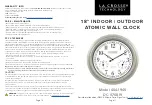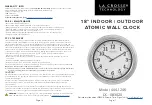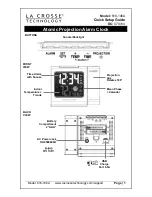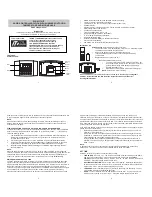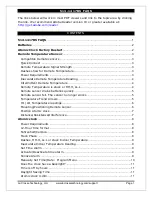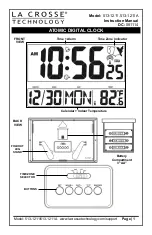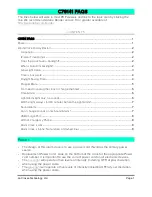
M
ULTI
-S
OURCE
S
YSTEM
- G
ENERAL
8 / 31
Multi-Source Function System 7001RC - V02.01
hopf
Elektronik GmbH
Nottebohmstr. 41 • D-58511 Lüdenscheid • Tel.: +49 (0)2351 9386-86 • Fax: +49 (0)2351 9386-93 • Internet: http://www.hopf.com • E-Mail: [email protected]
1.2 Fundamental Problems of Multi-Source Systems
Multi-source systems have more than one sync. source. Each of these sources is evaluated
and monitored in its own right. In this situation it is necessary to be aware of the problem that
the various time transfer formats may contain different information about the signal status,
time difference to UTC etc.
Due to the differences in time transfer formats several points should be noted when feeding
information into a multi-source system:
1.2.1 Status Information as a Component of Time Transfer
There are transfer formats where, for purposes of differentiation of signal quality, the only
difference is whether the signal can be evaluated or not.
An example of this is the GPS signal – this is either received and evaluated correctly,
thereby representing a valid sync. source, or the signal cannot be evaluated and the source
is classified as invalid.
1.2.2 Time Zone / Time Difference to UTC
A time zone is a section of the earth’s surface across which a common time applies. This
runs ideally from the poles along the lines of longitude. The time zone is defined by the time
difference between local time and UTC (Coordinated Universal Time).
The time base is defined from:
•
The time zone: time difference from local time to UTC
•
and the hour offset due to Summer/Wintertime changeover
1.2.3 Summertime/Wintertime Changeover (ST/WT changeover)
In the summer months many countries change to another time zone. In this way, Central
European Time (CET) applies in most middle European countries in winter (UTC+1h);
however in the summer months Central European Summer Time (CEST) applies (UTC+2h).
There are time transfer formats that carry out a ST/WT changeover with or without an
announcement.
In the case of a ST/WT changeover without an announcement the time leaps by one hour,
without the receiver being able to prepare for this. Since the time output is always prepared
in advance, other sub-systems that are synchronised by the receiver cannot accept the
ST/WT changeover and therefore continue to operate with an incorrect time until the next
time transfer.
For this reason these times must be known to the receiver when there are time transfer
formats that transmit the ST/WT changeover times without an announcement or do not carry
out any ST/WT changeover at all. Only in this way is it possible for the clock system to
output the correct local time.
Basically there are three possible signal combinations for handling ST/WT:
1.
The signal sends an announcement prior to changeover (e.g. DCF77)
2.
The signal changes over without an announcement (e.g. IRIG-B)
3.
The signal ignores the changeover and continues without a leap (e.g. GPS)


























